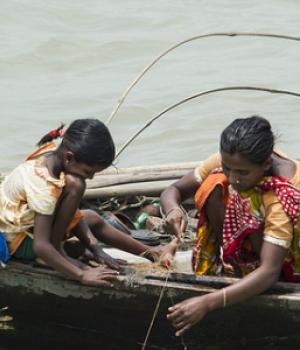by Aziza Hena
Bangladesh, one of the lands most vulnerable to the impact of climate change, is experiencing a gradual sea-level rise each year. A study shows that the estimated sea-level rise on the Bangladeshi coast will jump up from 0.4 to 1.5 meters by 2100.
Salinity intrusion is a paramount consequence of the sea-level rise in the South-west coastal areas of the country which impacts the coastal biodiversity tremendously. Coastal communities suffer a lot from salinity as it affects both soil and water on which human well-being crucially depends. About 20 million people have already faced the crisis of drinking water in the salinity areas of Bangladesh.
Many health effects are attributed to salinity in the water such as hypertension, stroke, dysentery, diarrhea, and skin disease. Among the coastal population, women have to endure more health adversities caused by water salinity because of their greater consumption of water, as compared to men.
Women and girls experience heightened vulnerabilities to reproductive health problems as a consequence of using saline water during their menstrual, maternity, and postnatal periods. Higher rates of miscarriage, child mortality, and the growing risk of female infertility are harsh realities in coastal districts. Moreover, high salt intake increases the risk of hypertensive disorders during pregnancy, including gestational hypertension and preeclampsia.
Menstrual hygiene management is one of the biggest health challenges women are facing in the remote areas of Bangladesh. Among the remote areas, coastal locations exhibit shocking facts concerning women’s hygiene practices during menstruation. In recent years, the misuse of birth control pills to stop the menstrual cycle has become a common practice among young women living on the coast of the country.
Several factors are associated with women’s adoption strategy to halt menses. Firstly, many women and girls of today are aware of the long-term urinary tract infection and degraded health status of their previous generation caused by using saline water in the course of menstruation.
Secondly, limited or no access to menstruation protection products is another problem women and girls are experiencing in the coastal locations. According to the preliminary report of the Bangladesh National Hygiene Baseline Survey conducted by the collaboration of the Government of Bangladesh and the International Centre for Diarrhoeal Disease Research, Bangladesh (ICDDR, B) and WaterAid in 2014, more than 80% of women and adolescent girls in Bangladesh depend on using old cloth rags during their menses.
The lack of accessibility and affordability of sanitary napkins or pads pushes women to use cloth rags that require water-wash for the purpose of reuse. Unfortunately, women have to wash the cloth rags in water sources affected by salinity which results in reproductive health difficulties. To avoid using the rags washed in contaminated and saline water, women prefer to take oral contraceptives and stop their periods.
The reasons why women use birth control pills with the intention of stopping the menstrual cycle seem logical from their standpoints. However, experts confirm that taking these oral pills without any prescription or medical advice has both a short-term and long-term impact on reproductive and mental health.
Birth control pills cause many health problems including high blood pressure, cardiovascular disease, migraine headaches, cancer, gallbladder disease, etc. On the basis of evidence, the Office on Women’s Health (OWH) reveals that birth control pills increase the risk of blood clots, high blood pressure, or hypertension which may lead to heart attack or stroke.
Also, birth control pills are thought to have detrimental impacts on the emotional well-being and lifestyle of women and girls. Research published in 2014 in Frontiers in Behavioral Neuroscience shows that birth control pills affect the sleep-wake cycle, hormone release, eating habits, digestion, and body temperature and escalate the risk of psychiatric illnesses like depression and anxiety.
Apart from reproductive health adversities, women endure some significant skin diseases in the coastal areas. A report by Mongabay mentions that coastal girls have witnessed their elders suffering from urinary infections and skin diseases due to the lack of access to fresh water.
Coastal Women in the private domain have to perform water-related household chores which require daily consumption of water from the sources within reach. The worse luck is that the available water sources containing salt have been the end result of sea level rise and excessive shrimp cultivation in this given area. Water from these sources, for bath and domestic use, infects women with potential skin diseases.
In the article titled “Water salinity, women and climate change”, the author Sayeeda Zeenat Karim claims that skin diseases, stemming from saline water, victimize women with social exclusion and denial, mental stress, and negligence by family members. To some extent, such diseases are responsible for women’s unhappy conjugal life or undervalued status in the in-laws’ families.
Indeed, ensuring a safe water supply is a crying need in the coastal areas. At least, having been concerned about women’s health crises, the government and non-government sectors should organize pure and safe water establishments in the salinity areas. Moreover, safe management of menstrual hygiene should be made easily accessible among coastal girls and women.
A recent successful initiative with regard to establishing water tanks by Senora has been proved as a significant milestone in the development of coastal women’s lives. Senora, one of the leading sanitary napkin brands in the country, has built 12 water tanks across 6 points in Koikhali, Satkhira district to restore rainwater for women’s use, as Promila Kanya’s report “Senora’s water tanks help Koikhali women overcome period ordeals” says.
Many other projects are expected to work arm in arm with the aim of securing safe water and women’s health and hygiene on the coasts. We hope Senora’s contribution as a role model in this regard would encourage more organizations to put effort into the cause in the days to come.
About the writer:
Aziza Hena, is an independent researcher and freelance writer from Bangladesh.










